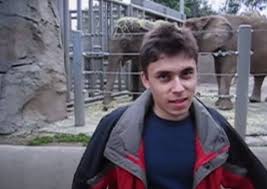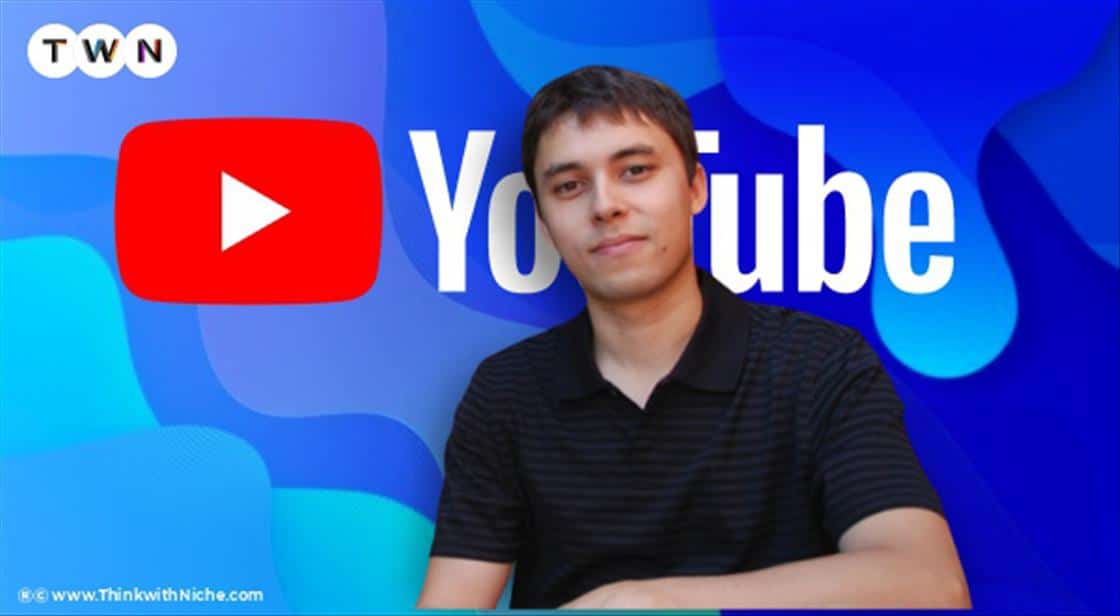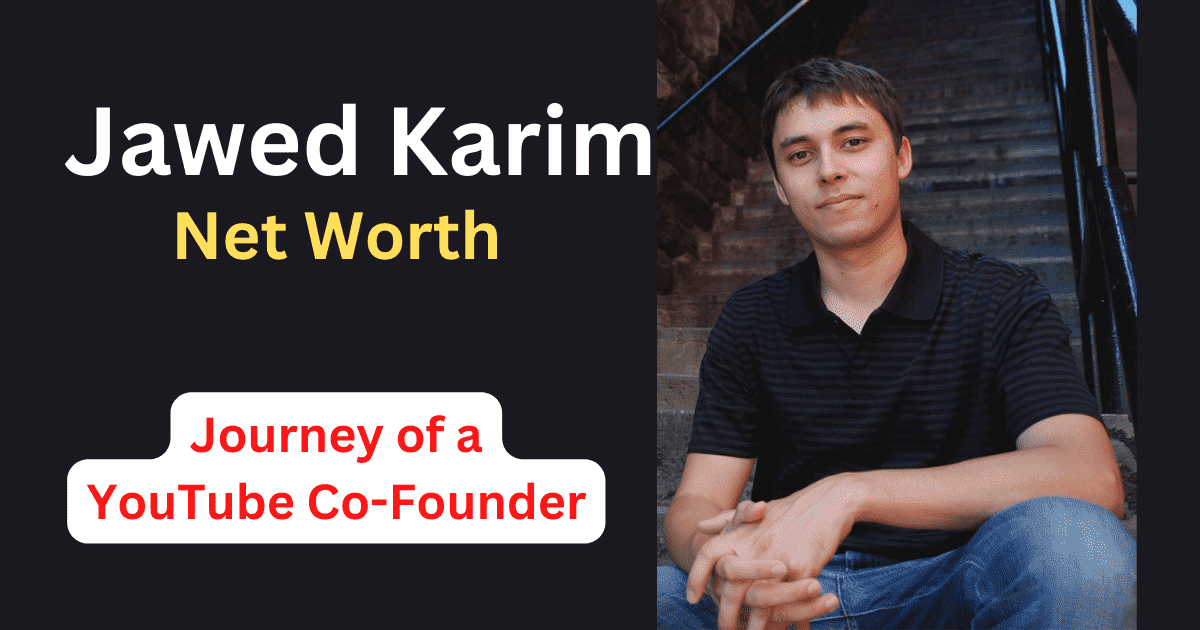Jawed Karim – a visionary software engineer and internet entrepreneur, he has indelibly left his mark on the digital landscape. This article delves into the life and achievements of Jawed Karim, a key figure in the birth of YouTube and a celebrated venture capitalist. Join us on a journey through his fascinating story, which reveals not only his role in shaping YouTube but also his significant contributions to the world of technology.

Early Life and Family
Born on October 28, 1979, in Merseburg, Germany, Jawed Karim boasts a unique heritage—his father, Naimul, hails from Bangladesh, while his mother, Christine, is of German descent. The Karim family’s journey took them from East Germany, where they encountered xenophobia due to Naimul’s non-native status, to West Germany, and ultimately to the United States in 1992. Settling in Saint Paul, Minnesota, both of Jawed Karim’s parents pursued fulfilling careers in scientific research. His father, Naimul, became a chemist at 3M, an international manufacturing conglomerate, while his mother, Christine, became a Research Associate Professor at the University of Minnesota, specializing in heart disease research.
Jawed Karim attended Saint Paul Central High School, graduating with distinction in 1997. His journey to the University of Illinois at Urbana-Champaign, where he would go on to make history, is a testament to his unwavering determination and passion for innovation. Karim was drawn to the university by the knowledge that the world’s first popular web browser, Mosaic, had been developed there. Despite facing initial setbacks, Karim’s persistence paid off, and he enrolled in the computer science department, where his educational and professional journey truly began.
Also read: Jessie Phoenix Jopling
Career: From PayPal to YouTube
During his junior year at the University of Illinois, Karim received a job offer that would change the trajectory of his life: a position at PayPal. In the year 2000, PayPal was still in its infancy, far from the global financial juggernaut it would become. Karim’s exceptional programming skills, honed during his internship at Silicon Graphics, set him apart and made him an attractive prospect for PayPal.
One pivotal moment in Karim’s career was his role in designing PayPal’s real-time internet anti-fraud detection system. This innovation would not only transform PayPal but also influence online payment processing services worldwide. His decision to accept the PayPal job, despite temporarily interrupting his studies, led to his graduation in 2004 with a Bachelor of Science in Computer Science.
It was during his tenure at PayPal that Karim’s path crossed with Steve Chen and Chad Hurley, two colleagues who would go on to co-found YouTube. The trio shared a common dream: to create a platform where people could easily share videos online—a vision that would reshape the digital landscape.
Creating YouTube: A Collective Vision
The founding of YouTube is a story that combines the talents and aspirations of Karim, Chen, and Hurley. While their individual accounts may vary in some details, they converge on the essential aspects of the journey. Karim’s perspective asserts that he had been seeking specific video clips online in late 2004 and was frustrated by the difficulty of finding them. This frustration birthed the idea of a video-sharing platform where users could readily access a vast array of videos.
At its core, YouTube aimed to democratize content creation and sharing—a radical notion in the early 2000s when installing video players to view online content was the norm. Karim’s desire to watch videos of significant events, such as Janet Jackson and Justin Timberlake’s Super Bowl XXXVIII halftime show or the 2004 Indian Ocean tsunami, served as the catalyst for the platform’s creation.
YouTube’s journey began on Valentine’s Day in 2005, when Karim, Chen, and Hurley embarked on developing the website. It officially went live on April 23, 2005, hosted on a single web server rented for $100 per month. Initially, YouTube struggled to attract users and define its identity, with random video suggestions and even Craigslist postings failing to gain traction.
However, a remarkable transformation occurred as users themselves began shaping YouTube’s identity through their content. The site’s growth and venture capital funding soon followed. Karim, Chen, and Hurley’s connection to the PayPal Mafia, particularly Sequoia Capital’s Roelof Botha, proved instrumental. In 2006, Google recognized YouTube’s potential and acquired it for $1.65 billion in Google stock.
Karim’s role shifted to that of an advisor, but his contribution to YouTube’s inception and success remains integral to its history. The platform has since ascended to the pinnacle of social media, standing alongside giants like Facebook, Twitter, Instagram, and Snapchat.
Post-YouTube Ventures: Philanthropy, Consulting, and Education
Following the sale of YouTube to Google, Karim pursued higher education, earning a Master of Science in Computer Science from Stanford University in 2006. His commitment to fostering innovation continued as he co-founded Youniversity Ventures, now known as YVentures, with partners Kevin Hartz and Keith Rabois. This venture capital firm not only provides startup capital but also invaluable expertise to budding entrepreneurs.
Karim’s journey from East Germany to Silicon Valley, from YouTube co-founder to venture capitalist, is a testament to his unwavering belief in the power of talent and creativity. His commitment to technology’s transformative potential is a driving force behind his philanthropic efforts and his dedication to nurturing the spirit of innovation in Silicon Valley and beyond.
Also read: Geraldine Seithel
Conclusion
Jawed Karim’s life story is a captivating narrative of a young boy’s journey from East Germany to becoming a co-founder of one of the most influential platforms in the digital age. From his early fascination with technology to his pioneering role in creating YouTube, Karim’s journey is an inspiring testament to the boundless possibilities of innovation.
As we celebrate the life and contributions of Jawed Karim, we honor not only his pivotal role in the YouTube story but also his enduring commitment to empowering the next generation of tech innovators. In an ever-evolving digital landscape, Karim’s legacy continues to inspire and shape the future of technology.
10 Questions and Answers
- What is Jawed Karim best known for in the tech industry?
- Jawed Karim is best known as one of the three co-founders of YouTube, a globally recognized video-sharing platform.
- Where was Jawed Karim born and what is his heritage?
- Jawed Karim was born in Merseburg, Germany, and he is of Bangladeshi and German descent.
- What did Karim’s parents do for a living in the United States?
- In the United States, Jawed Karim’s father, Naimul, worked as a chemist at 3M, while his mother, Christine, became a Research Associate Professor specializing in heart disease research at the University of Minnesota.
- Which university did Jawed Karim attend, and why did he choose it?
- Jawed Karim attended the University of Illinois at Urbana-Champaign. He chose this university because it was where the world’s first popular web browser, Mosaic, had been developed, reflecting his desire to be in a hub of innovation.
- What pivotal role did Karim play at PayPal during his time there?
- At PayPal, Karim designed the real-time internet anti-fraud detection system, a groundbreaking innovation that had a significant impact not only on PayPal but also on the wider online payment processing industry.
- When did YouTube officially go live, and what challenges did it initially face?
- YouTube officially launched on April 23, 2005. Initially, the platform faced challenges in attracting users and defining its identity. It struggled with random video suggestions and even resorted to offering money on Craigslist for user uploads.
- What was the major divergence between Karim’s account and those of Steve Chen and Chad Hurley regarding YouTube’s founding?
- Karim insisted that the dinner party where Chen and Hurley claimed they first dreamed of sharing videos online never happened. He asserted that the concept of YouTube was his idea alone.
- Who is Roelof Botha, and how did he contribute to YouTube’s success?
- Roelof Botha, an investor who worked for PayPal in 2000, was instrumental in YouTube’s success. He oversaw Sequoia Capital, which invested $11.5 million in YouTube, helping fuel its growth.
- What was the total value of Google’s acquisition of YouTube, and what was Karim’s role after the acquisition?
- Google acquired YouTube for $1.65 billion in Google stock. After the acquisition, Karim became an advisor to the company, while Steve Chen and Chad Hurley continued to manage its operations.
- What educational path did Jawed Karim pursue after YouTube’s sale, and what did he co-found with Kevin Hartz and Keith Rabois?
- After the sale of YouTube, Karim pursued a Master of Science in Computer Science from Stanford University in 2006. He co-founded Youniversity Ventures, later known as YVentures, with partners Kevin Hartz and Keith Rabois. This venture capital firm provides funding and expertise to startups.
